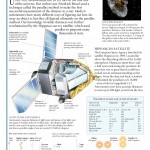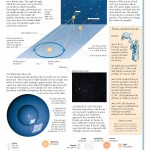Until 1838, Astronomers had little idea of the true size of the Universe. But in that year, Friedrich Bessel used a technique called the parallax method to make the first successful measurement of the distance to a star.
Modern astronomers have many different ways of figuring out how far away an object is, but they all depend ultimately on the parallax method.
As the Earth orbits the Sun, the nearer stars seem to move from side to side against the background of more distant stars. The angle through which the star moves over a period of six months is called its parallax.
Knowing this angle, astronomers can use simple geometry to calculate the star’s distance. The smaller the parallax, the further away the star.
Related posts:
When a Metorite collides with Earth it can form an impact crater – a bowl – shaped hollow in the Earth’s surface. Space rocks have produced in this way throughout Earth’s life, especially when the planet was young, about 4 billion years ago. Space rocks do not have to hit Earth to have a devastating effect. On june 30, 1908, there was an explosion 3.5 miles up in Earth’s atmosphere, above...
The geologic time scale blankets the degree of the being of Earth, from around the range of 4600 million years in the past to the present day. It's stamped by Worldwide Limit Stereotype Areas and Indicates. Geologic time units are (in place of slipping specificity) ages, times, periods, ages, and develops; and the relating chronostratigraphic units, which measure "shake-time", are endotherms, eryt...
The sequence of the universe portrays the history and fate of the universe consistent with Enormous detonation cosmology, the predominant exploratory model of how the universe started to exist and advanced as time passes, utilizing the cosmological time parameter of commoving facilitates. The moment in which the universe is thought to have started quickly extending from an extensively towering for...
Light always leaves from a young, star forming blue galaxy near the edge of the visible universe. Some of the light passes through a large cluster of galaxies and surrounding dark matter, directly in the line of sight between earth and the distant galaxy. The dark matter’s gravity acts like a lens, bending the incoming light.
The largest galaxies have nearly billion stars. There are an estimated billion stars in the milky way, our galaxy. If you tried to count all the stars in just our galaxy at a rat of one star per second, it would take you about 3000 years.
Until the 1st successful flyby of Mars took place 1965 simply by simply Mariner Four, numerous speculated concerning the reputation associated with water drinking h2o around the globe's area. This is based on noticed periodic versions learn how to as well as dark sections, specially in the particular polar latitudes, which were ocean and also locations; extended, dim grooves had been construed...
Stellar advancement is the methodology by which a star experiences an arrangement of radical updates around its lifetime. Hinging on the mass of the star, this lifetime extends from just a few million years for the most gigantic to trillions of years for the slightest huge, which is impressively longer than the time period characterized by the universe. All stars are born from falling mists of...
The universe is expanding at an ever – increasing rate, with something that astronomers call dark energy appearing to push it apart faster than gravity can pull it together. Type la supernovas are stars that explodes with a predictable brightness. Light from distant supernovas locks dimmer and redder than expected, implying that the universe is expanding. The more distant the star, the fast...
A neuron star is a sort of stellar leftover that can consequence from the gravitational breakdown of a huge star around a Sort II, Sort Ib or Sort Ic supernova occasion. Such stars are made very nearly truly out of neutrons, which are subatomic particles without electrical accuse and of a little more extensive mass than protons. Neuron stars are exceptionally sultry and are backed in opposi...
Vostok 1 (Russian: Восток-1, East 1 or Arrange 1) was the first spaceflight in the Vostok system and the first human spaceflight in history. The Vostok 3KA space apparatus was started on April 12, 1961. The flight took Yuri Gagarin, a cosmonaut from the Soviet Union, into space. The flight checked the first time that a human dropped in space, and in addition the first orbital flight of a manne...
Every object exerts a gravitational pull, including a single spacecraft. Merely by hovering above the asteroid. It could pull the rock off course. The approach could even be tried with the Dawn spacecraft, scheduled to finish its tasks in the asteroid belt by 2015. However, such a strategy would be very slow, requiring years or even decades to alter the path of the asteroid.
The Solar System comprises of the Sun and it is planetary framework of eight planets, their moons, and different non-stellar protests. It framed more or less 4.6 billion years back from the crumple of a titan atomic fog. The boundless larger part of the framework's mass is in the Sun, with the vast majority of the remaining mass held in the planets. The four more minor inward planets, Mercury...
Original person has an ambiguous temporal experience inside the box and becomes his double. Original person on undisturbed timeline decides to time- travel. He activates a time – delay device and leaves the area to avoid clashing with his double.
In the connection of spaceflight, a satellite is an item which has been put into space by human endeavour. Such protests are now and again called simulated satellites to recognize them from instinctive satellites for example the Moon.
The Solar system comprises of the Sun and its planetary framework of eight planets, their moons, and different non-stellar questions. It shaped roughly 4.6 billion years back from the breakdown of a monster sub-atomic mist. The unfathomable larger part of the framework's mass is in the Sun, with the majority of the remaining mass held in the planets. The four more diminutive internal planets, Merc...
A star chart differs from an astronomical catalog, which is a listing or tabulation of astronomical objects for a particular purpose. A planisphereis a type of star chart.
Scratches is the fourth planet from the Sun and the second most diminutive planet in the Earth's planetary group. Named following the Roman lord of war, its frequently depicted as the "Red Planet", as the iron oxide common on its surface gives it a rosy appearance. Scratches is a physical planet with a flimsy climate, having surface offers reminiscent both of the effect pits of the Moon and th...
Red Planet happens to be host to 5 working spacecraft: a few within side orbit—the Mars Odyssey, Mars Convey, and also Red Planet Reconnaissance Orbiter; and a couple on the surface—Mars Pursuit Rover Chance and also the Red Planet Science Laboratory Curiosity. Defunct ballistic capsule at first glance contain MER-A Spirit, and several additional nonmoving landers as well as rovers, both profi...



 Upload your infographic here and contribute to our community.
Upload your infographic here and contribute to our community. 
Leave a Reply